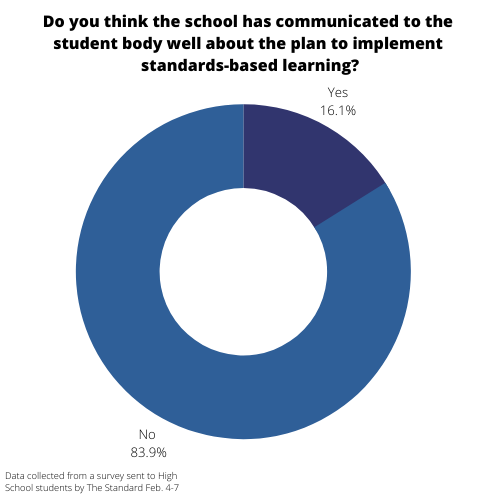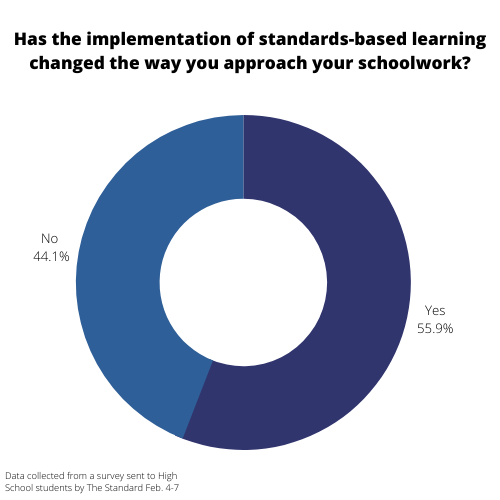Implementation and logistics
February 7, 2022
According to Assistant Principal Natalie Jaworski, standards-based learning has three components: assessing, grading and reporting. Standards-based assessment is when feedback is connected to a rubric, while standards-based grading is when students’ grade in a class is determined by how they perform on the standards rather than a percentage or points system. Meanwhile, standards-based reporting is when a student’s performance on each standard is included in their transcript.
Jaworski said all departments have now implemented standards-based assessing, with the exception of math.
Meanwhile, Donovan said only the Social Studies and World Languages and Cultures departments use standards-based grading. The High School altogether does not use standards-based reporting. Jaworski said there is “no timeline” for fully implementing standards-based grading or reporting.

As for impact on grades, there has been nothing noticeable. Jaworski said the school analyzes data, and there has been no inflation in grades since the introduction of standards-based learning.
Furthermore, according to similar data, Donovan said AP scores and college admissions rates have not significantly changed since the implementation of standards-based learning.
Math Teacher and Department Head David Hill said the Math Department plans to move to standards-based assessing eventually, but has no set date. According to Hill, currently, the department teaches by following standards but does not assess according to these standards.
In order to assess students based on learning standards, Hill said the department will test out rubrics they have created which consist of standards that apply to every mathematical topic covered in the High School.
Hill said these “prototype rubrics” will be used on assessments in the Algebra II and Geometry classes this year, and the department will make changes to the rubrics based on how effective and informative they are and whether test results are consistent with previous non-standards-based assessments.
As most classes now use standards-based assessing, Donovan said the High School is now shifting focus to standards-based grading and reporting. Donovan said feedback from students and parents is key in this process.
“When we consider the process, we really want to get student and parent feedback about how student learning is graded and reported on,” she said. “That way, you’re getting information that’s meaningful to you to help you continue to grow in your learning journey.”
According to Donovan, the school made a plan to introduce standards-based learning practices school-wide while conducting a self-study in 2015. This plan was put into practice starting in 2016 and has already been fully implemented by the Lower School and the Middle School.
While this novel approach to education at the school is taking flight, Donovan said the High School has no plans to solely report on standards and remove letter grades so as to avoid conflict with the university admissions process.

“Even as we consider standards based learning … we’re committed to keeping letter grades in the High School,” she said. “That’s really important for the university admissions process. While you don’t only plan with that process in mind, that’s really important for us. And we know that our students and families want to be competitive in that process.”
According to Donovan, the school has made efforts to educate students, parents and teachers on standards-based learning; students learn the system in their social studies and language classes and teachers complete courses around assessment, learning from professionals. Meanwhile, parents are provided with opportunities to learn about the system through presentations by the school, such as the two standards-based learning webinars held during the 2020-21 school year.
Donovan said standards-based learning is an attempt to create a more effective learning process.
“We want to recognize that we’re not just talking about changing grading,” she said. “We’re talking about being really intentional about how we design learning and how we design assessment and think about how we grade.”

